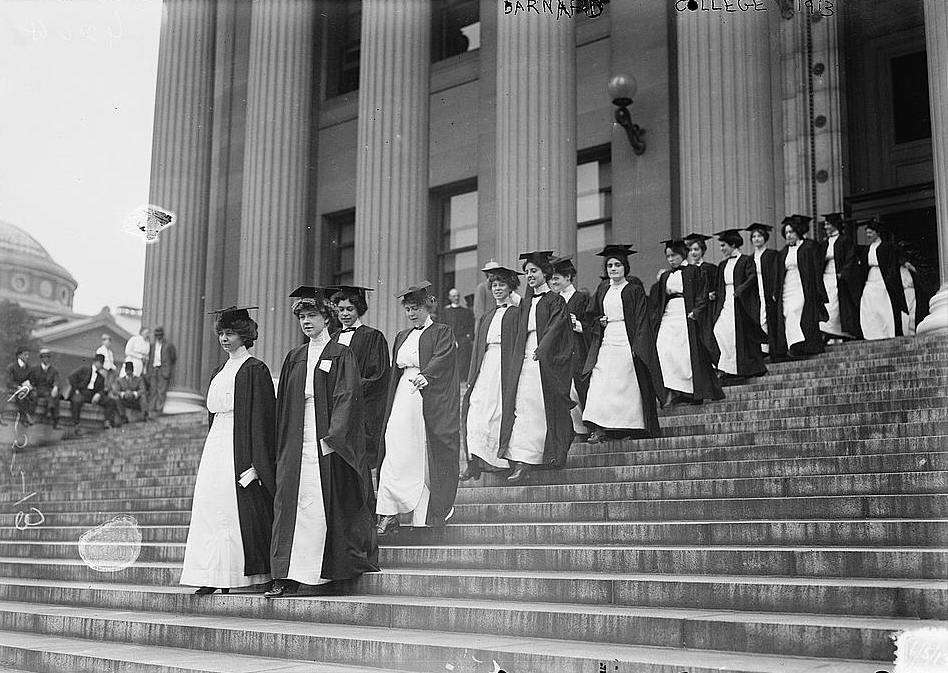College Intel
Barnard College Admissions

If you were to ask a Columbia student from off of the streets of the Upper West Side to describe the Barnard College student body, they would probably say something to this effect: “Barnard students have a certain coolness factor to them, they love the liberal arts, and they’re certainly feminists!” A member of the historically-female Seven Sisters, Barnard is as academically distinguished as it is culturally relevant, with a campus located in the Morningside Heights neighborhood of Manhattan. Throughout its storied history, it has graduated alumni such as comedian Joan Rivers, actress and director Greta Gerwig, and television personality Martha Stewart.
Barnard is unique among the Seven Sisters in its status as an independent institution that shares its academic facilities with a corresponding Ivy League university. While Barnard has led a historically fraught relationship with its affiliate, Columbia University, today students cross-register for classes across both schools and share a common campus culture. Barnard is still legally and financially distinct from Columbia, but in practice Barnard is an undergraduate college of Columbia, and its students graduate with a degree listing both institutions (Barnard College of Columbia University). Barnard students may also take classes at the Juilliard School, the Manhattan School of Music, and the Jewish Theological Seminary.
Roughly 3,500 undergraduates at Barnard major in one of 50 disciplines. The shared intellectual experience of these undergraduates is shaped by a thorough core curriculum, “Foundations,” that requires the following coursework: a first-year writing class; a first-year seminar class; two classes each in a foreign language, arts & humanities, social sciences, and sciences; six “Modes of Thinking” courses covering “New York City,” “Global Inquiry,” “Social Difference,” “Historical Perspective,” “Thinking Quantitatively and Empirically,” and “Thinking Technologically and Digitally;” a physical education requirement; and a senior-year thesis, research, or creative project. Thus, the famed rigor of the Columbia core curriculum is shared by its affiliate.
The college was founded in 1889 in response to Columbia’s refusal to become coeducational. It was named after Frederick Augustus Porter Barnard, a former president of Columbia who advocated for coeducation. Throughout the 20th century, Barnard’s relationship with Columbia was dynamic, sometimes amicable and sometimes contentious. Some members of the community envisioned a future in which Barnard fully integrated with Columbia in a merger akin to Radcliffe College’s merger with Harvard, but such an agreement faced opposition from Barnard’s leaders. While the relationship remains complicated, the present arrangement allows for Barnard to maintain institutional autonomy while giving its students access to the ample resources and opportunities inherent to an Ivy League education.
When it comes to student life, Barnard’s undergraduates get the best of both worlds. The buzz and activity of Columbia couple with the cherished traditions and idiosyncrasies of the college, and the siren call of the City that Never Sleeps, to ensure that there is always something fun and stimulating to do. Undergraduates can be found socializing in campus sororities, cross-pollinating with Columbia student groups, creating funny political zines through the infamous Barnard Zine Club, and competing in the Ivy League conference in NCAA Division I. When they’re not tied up with student life, students are taught by world-renowned academics, which in the past have included Nobel Prize Laureates Elie Wiesel and Gabriela Mistral, and Pulitzer Prize winner John Cheever.
Barnard remains one of the most competitive members of the Seven Sisters, with single-digit acceptance rates in recent years. For admission to the Class of 2027, Barnard received 11,804 applications and accepted 944 students, for an 8% acceptance rate. As of 2015, Barnard admits transgender applicants who “consistently live and identify as women.” As with any liberal arts college, and especially one with a history of committing to the advancement of womankind, Barnard values applicants who understand its unique history and the particulars of its culture. If you can’t imagine yourself anywhere else and want to give your application that competitive edge, Ivy Coach has you covered!
TOWARD THE CONQUEST OF ADMISSION
If you’re interested in Ivy Coach’s college counseling, fill out our complimentary consultation form and we’ll be in touch.
Get Started